Russland: Angriffe und Festnahmen an Moskau Pride Events nähren den Verdacht, dass die Behörden Gewalt und Diskriminierung gegenüber LGBTI nicht nur billigen, sondern fördern

update 11.06.2013: Landesweites Gesetz gegen „Homo-Propaganda“ von Duma angenommen
update 07.06.2013: Weitere NGO bedroht – hohe Busse für LGBT-Festival in St. Petersburg
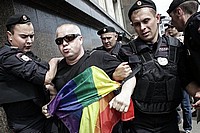 Während in der Ukrainischen Hauptstadt Kiev eine allererste Pride durchgeführt werden konnte, wurden alle Anlässe in Moskau verboten. Eine Reihe dezentraler, Demonstrationen und Aktionen in der Öffentlichkeit sollten trotzdem durchgeführt werden, um auf die anhaltenden Diskriminierung und Gewalt gegen LGBTI aufmerksam zu machen.
Während in der Ukrainischen Hauptstadt Kiev eine allererste Pride durchgeführt werden konnte, wurden alle Anlässe in Moskau verboten. Eine Reihe dezentraler, Demonstrationen und Aktionen in der Öffentlichkeit sollten trotzdem durchgeführt werden, um auf die anhaltenden Diskriminierung und Gewalt gegen LGBTI aufmerksam zu machen.
Dabei wurden LGBTI-Aktivist_innen verhaftet, obwohl eigentlich sie die Opfer von körperlicher Gewalt durch aggressive Angreifer waren.
Die Veranstaltungen wurden von Amnesty-Beobachterinnen dokumentiert. Die Polizei nahm mindestens 30 Demonstranten an drei Standorten in der Innenstadt von Moskau fest: vor dem Parlament, vor dem Büro des Bürgermeisters und im Gorky Park.
Das Scheitern der Moskauer Polizei, Lesben, Schwule, Bisexuelle, Transgender und Intersex (LGBTI) Demonstranten vor physischen Angriffen am Samstag schützen, verstärkt den Eindruck von staatlich gebilligter oder gar geförderter Gewalt und Diskriminierung.
„Anstatt die friedlich demonstrierenden LGBTI festzunehmen, hätte die russischen Behörden diese vor Gewalt und Angriffen durch Extremisten und vor diskriminierenden Einstellungen schützen müssen.“
David Diaz-Jogeix, Programmdirektor Europa und Zentralasien Amnesty International.
(„Instead of detaining peaceful LGBTI demonstrators, the Russian authorities should protect them from extremist attacks based on discriminatory attitudes held by some.“)
Amnesty Medienmitteilung: Gay activists arrested despite being victims of violence (PRE01/247/2013).
Amnesty Schweiz: Angriffe und Festnahmen – Behörden fördern Diskriminierung von LGBTI.
Medien:
Blick: Höchster Schwuler Russlands verhaftet
NZZ: Russland, Georgien und Ukraine – Festnahmen nach Homosexuellen-Paraden
ria-novosti und video: 30 Held at Moscow Gay Pride Rally (Englisch, video, 1:08)
Bilder: 20 spannende Fotografien von Evgeniy Feldmann auf lenta.ru
Russland:
Amnesty International: Länderbericht Russland 2013 und 2012 und 2011.
Amnesty Schweiz: Länderseite Russland, laufend aktualisiert Hier Unterschreiben: Petition an Präsident Putin (PDF, zum Sammeln)
Präsident Putins Zermürbungstaktik und Hexenjagd – Amnesty Report (April 2013)
Urteile gegen Pussy Riot revidiert – doch noch keine Gerechtigkeit (Okt 2012)
Zürich, Podiumsdiskussion:
6. Juni 2013: Regenbogenverbot in Russland (Zürich Pride Festival 2013)
IDAHOT 2013: 17. Mai – Internationaler Tag gegen Homophobie und Transphobie.
IDAHOT 2013 – Übersicht Aktionen, Berichte, Erfolge, Rückschläge
Schwierige Lage in Ost- und Mittelosteuropa:
Ukraine: Kiev Pride 2013. Ein BRAVO an die rund 100 mutigen Leute (Mai 2013)
Moldau: Erste, kurze Pride soll der Anfang einer blühenden Bewegung sein (Mai 2013)
Ukraine: Homophobie, Transphobie und Hassverbrechen – Amnesty Report (Mai 2013)
Georgien: Brutale Gewalt gegen die Pride in Tbilisi – Versagen der Polizei (Mai 2013)
Mazedonien: Angriffe auf LGBT-Aktivist_innen (April 2013)
Türkei: Film „Benim Çocugum“ (Mein Kind) der Elternvereinigung (April 2013)
Ukraine: UPR – Kampf gegen Polizeigewalt – aber keine Grundrechte für LGBT (Apr 2013)
Belarus: Zivilgesellschaft wird mundtot gemacht – Amnesty Report (April 2013)
Bosnien und Herzegowina: homophobe und transphobe Hass-Angriffe (April 2013)
Ukraine: Stanislaw Mischtschenko zeigt ‚K-People – Queeres Leben in Kiew‘ (Jan 2013)
< ! ----------------------------------------------------------------------------------->
Medienmitteilung (Englisch)
und Bilder
< ! -----------------------------------------------------------------------------------> TOP –
Russia: Gay activists arrested despite being victims of violence,
Amnesty International Press Release, 26. May 2013, PRE01/247/2013.
The failure of Moscow police to protect lesbian, gay, bisexual, transgender and intersex (LGBTI) protesters from physical attacks on Saturday reinforces an impression of state sanctioned violence and discrimination, Amnesty International said.
In events monitored by Amnesty International, at least 30 LGBTI protesters were detained by police in three locations in the centre of Moscow: in front of Parliament, the Mayor’s Office and Gorky Park.
The activists were attempting to hold pickets to protest against homophobic laws, including a draft federal law banning the so-called „propaganda of homosexuality“ and to attract attention to the persisting discrimination and violence against LGBTI people in the country.
„Instead of detaining peaceful LGBTI demonstrators, the Russian authorities should protect them from extremist attacks based on discriminatory attitudes held by some,“ said David Diaz-Jogeix, Amnesty International’s Deputy Programme Director for Europe and Central Asia.
The failure to protect the activists from violent attacks by counter-protesters and to prosecute those responsible for violence against LGBTI people is a breach of Russia’s international human rights obligations.
„These attacks against peaceful demonstrators should be promptly investigated, including the legal basis of the police to detain peaceful demonstrators,“ said Diaz-Jogeix.
„If no action is taken by the authorities to protect LGBTI people and perpetrators of violent attacks against LGBTI continue to enjoy impunity, this might be perceived by some as state sanctioned violence and discrimination.”
All three events were marred by physical violence and beatings of LGBTI protesters. One of the LGBTI activists was attacked by a group of counter-protesters, beaten and sprayed with pepper gas before the police intervened and detained him. He required medical assistance for his injuries.
The police yet again failed to prevent the violence and protect the peaceful LGBTI protesters. Moreover, the number of detained LGBTI activists was apparently larger than that of the perpetrators of the attacks.
Such incidents of violence against LGBTI activists are now frequent, as is the failure of the police to meet its obligations to investigate such attacks and hold the perpetrators accountable.
Even in cases where the perpetrators are identified and detained no action is taken, despite eye-witnesses statements and in some cases photo and video evidence of the attacks.
LGBTI activists had formally notified the authorities of their intention to organize LGBTI Pride marches for 25 May in Moscow, the town of Khimki in the Moscow region and in Kostroma. However, in all three cases the local authorities refused to grant their approval of the planned peaceful assemblies of LGBTI people, on grounds not coherent with Russia’s international obligations.
LGBTI activists attempted to challenge the refusal in the relevant courts of law, but the courts upheld the respective bans, despite the earlier judgment of the European Court of Human Rights concerning the Pride marches in Russia and finding a violation of the right to peaceful assembly, freedom of expression and discrimination.
The violence on Saturday is set against a background of persistence violence directed against LGBTI people. This includes the recent murders in Volgograd and attacks in Irkutsk, reportedly motivated by homophobia.
Local and federal authorities‘ legal and administrative initiatives effectively fuel discriminatory attitudes and violence against LGBTI people, instead of protecting the fundamental human rights of all people.
20 spannende Bilder von Evgeniy Feldmann zur Moskau Pride 2013
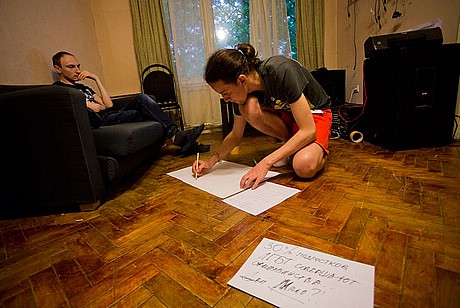
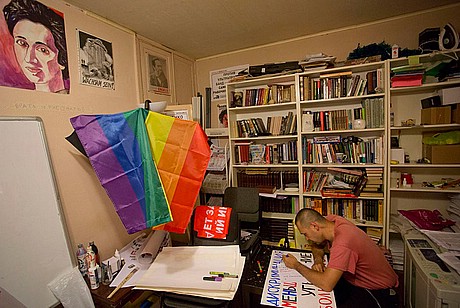
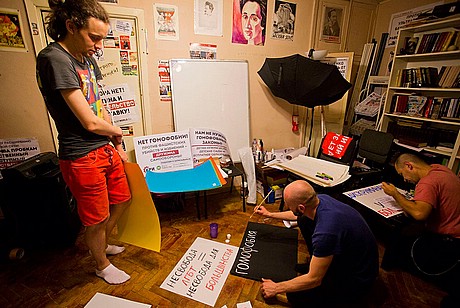
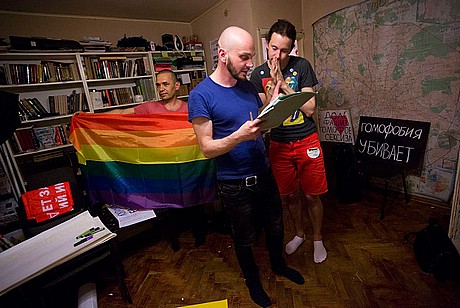
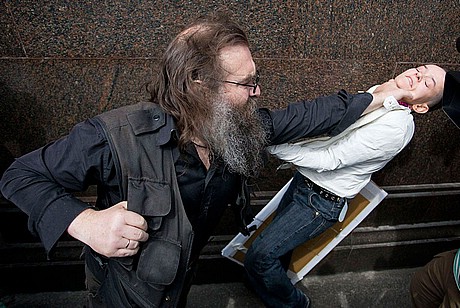
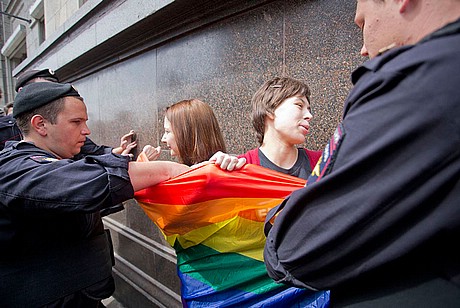
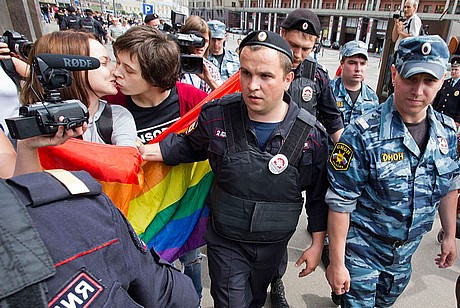
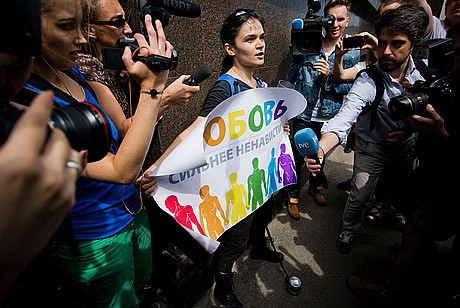
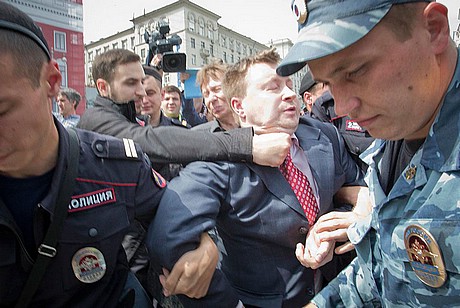
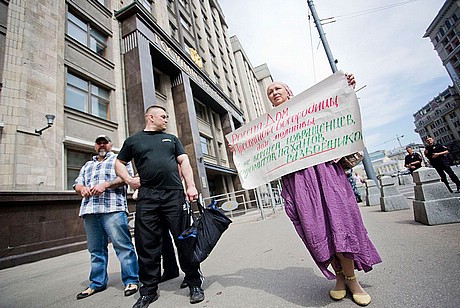
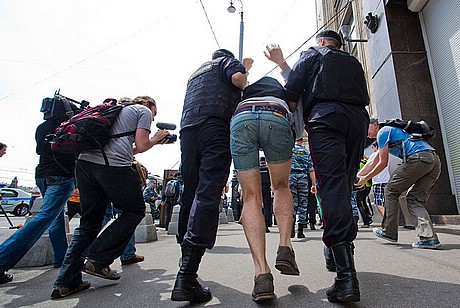
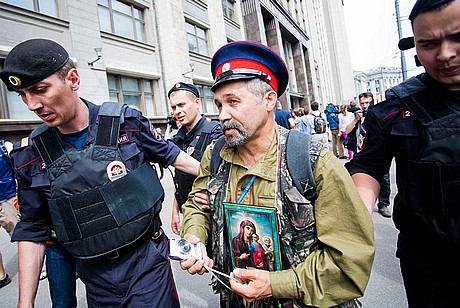
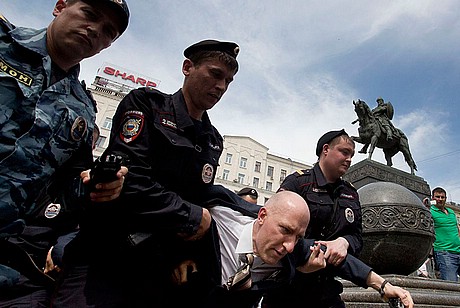
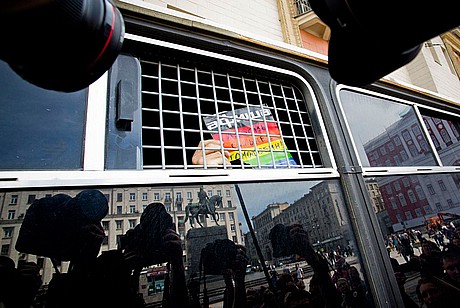
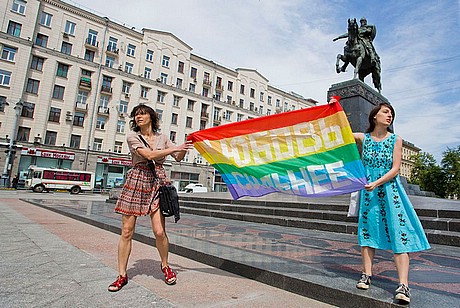
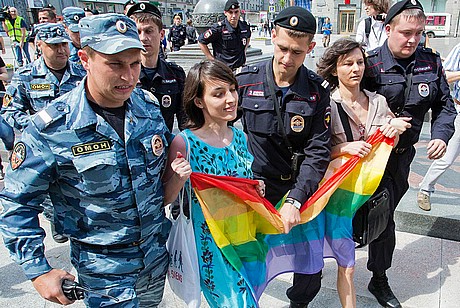
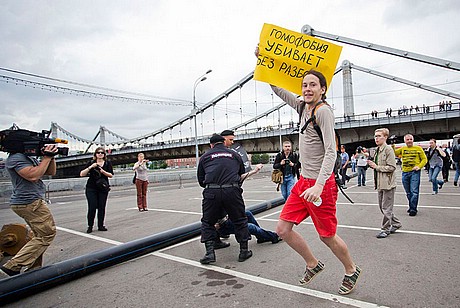
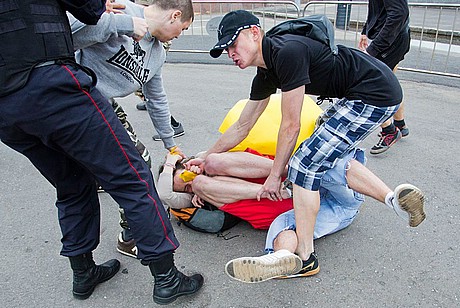
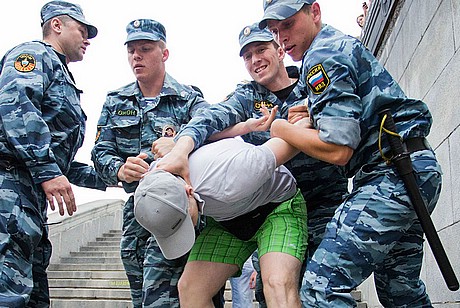
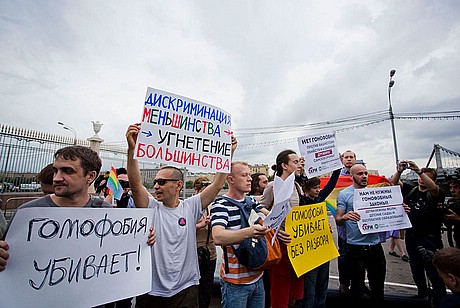
20 spannende Fotografien von Evgeniy Feldmann

